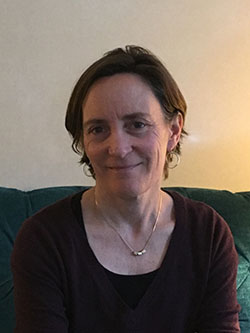Amy D'Andrade

Professor, School of Social Work
Preferred: amy.dandrade@sjsu.edu
Telephone
Preferred: (408) 924-5830
Office Hours
Office location: WSQ 215 H; Tuesdays 2-3PM; Fridays 4-5PM
Courses, AY 21-22
ScWk 200W Social Work Graduate Writing Course
Thursdays, Fall semester, 6:30-8:00PM, online
This is a graduate writing course with emphasis on the development of English for academic purposes that satisfies the university’s Graduate Writing Assessment Requirement (GWAR). Special emphasis is given on School of Social Work’s (SJSU) Transcultural perspective.
ScWk 298(a) Special Project
Tuesdays, Fall semester, 3:00-5:45 [held online]
Mondays, Spring semester, 3:00-5:45 [room tbd]
This required Advanced Year course emphasizes the application of social work research, theory, policy and practice concepts within a Master’s Special Project. In this first semester of this year-long course, students conceptualize and plan a project that systematically examines a social work issue within a specific field of practice. Topics to be covered include: an overview of professional writing styles; guidance in the selection of an appropriate research topic; the formulation of research questions and hypotheses; the development of measurement strategies and utilization of quantitative and qualitative research methodologies; and a review of SPSS software applications. Students are expected to demonstrate in their Special Project that they have sufficient mastery of social work professional skills in their assigned agency setting.
Recent Publications
D’Andrade, A. (2019). Professional stakeholders’ concerns about reunification case plan requirements. Social Service Review.
Parents whose children have been removed from their care due to maltreatment must resolve their problems within a limited time period in order to be reunified with their children. Child welfare workers create case plans outlining a set of services intended to facilitate this, but evidence on the best approach for helping these highly-challenged parents is limited. In this qualitative study, attorneys, caseworkers, managers, and service providers from four jurisdictions are interviewed to understand practice and decision-making in reunification case planning and service delivery. A thematic analysis of the data reveals these stakeholders have serious concerns about the number of services on case plans, and report that heavily loaded case plans can hinder reunification. To ensure agency efforts are effective rather than overwhelming, case planning and service delivery should better accommodate parents’ circumstances. Program models that ease parents’ access to services are also needed.
Crowe, K. & D’Andrade. A. (2018). Engaging community members in providing support for the dying and bereaved: Activities in social work community practice. Families in Society, 99(4), 338-346.
In this practice note, the authors describe three main community engagement strategies around empathy in times of suffering: (1) raising public awareness about the value of community support in times of grief with the creation of a neighborhood-based public campaign; (2) providing educational, skill-building workshops to instill confidence and communication skills among lay people in community, business, and medical settings that want to connect with people they know experiencing a personal difficulty; and (3) publishing a lighthearted, illustrated trade book and website/blog to make a difficult topic palatable and engaging to a broad audience. Activities were housed in a fiscally sponsored nonprofit the authors founded in 2014 called Help Each Other Out.
D’Andrade, A. (2017). Does fathers’ involvement in services affect mothers’ likelihood of reunification with children placed in foster care? Children and Youth Services Review, 81, 5-9.
Social science literature shows associations between fathers’ involvement with their children and beneficial developmental outcomes of those children. A related but smaller body of research in the child welfare services arena has found measures of father involvement to be positively associated with beneficial child welfare outcomes, including child’s reunification with parent after placement in foster care. However, the pathway by which father involvement affects reunification likelihood has not been determined. This study builds on the existing body of literature by testing a theoretical basis for the relationship between father involvement (measured as service use) and mothers’ reunification in a model controlling for family structure. I find that fathers’ involvement in services improves mothers’ likelihood of reunification, independently of family structure. Results suggest that agency efforts to involve fathers in services make sense both when the aim is to prepare the father for possible custody, and when the aim is to reunify the mother.
Education
-
PhD, Social Welfare, U.C.Berkeley, California, United States
-
Masters of Social Welfare, U.C.Berkeley, California, United States